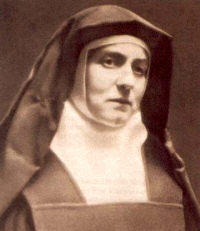 Today is the feastday of a remarkable 20th-century saint whom the philosophical and literary cognoscenti savored for other reasons until she was canonized by John Paul the Great in 1998 under her professed religious name 'Teresa Benedicta of the Cross'. Since then, pretty much only conservative Catholic cognoscenti (and a few Jewish converts, which is what she was) talk about her. Yet canonized or not, Stein's life, work, and person repay pondering by women and men, by the uneducated as well as the educated, by non-Catholics and unbelievers as well as by Catholics.
Today is the feastday of a remarkable 20th-century saint whom the philosophical and literary cognoscenti savored for other reasons until she was canonized by John Paul the Great in 1998 under her professed religious name 'Teresa Benedicta of the Cross'. Since then, pretty much only conservative Catholic cognoscenti (and a few Jewish converts, which is what she was) talk about her. Yet canonized or not, Stein's life, work, and person repay pondering by women and men, by the uneducated as well as the educated, by non-Catholics and unbelievers as well as by Catholics.The exception to the newfound silence is the gleeful, occasional assertion by the Church's cultured despisers that the Nazis murdered her not for her intense Catholicity but for her ethnic Judaism. Of course it was probably both; which was the icing and which was the cake, we will probably never know in via. But I suppose the standard line makes a perverse sort of sense in a world where the formal recognition of one's sanctity by the Catholic Church is virtually a guarantee of social and intellectual irrelevance—unless the saint happens to have died a very long time ago, in which case they can be abstractly admired from a safe temporal distance. Yet even Stein's sisters in the older Catholic religious orders don't much care for her either. That's because she rejected women's ordination after having had the then-rare temerity to consider the idea in the first place. I've even heard one feminazi nun say (a) that's probably why JP2 canonized her and (b) that's exactly why he shouldn't have. All I can say is that my talents as a parodist can't quite match that.
The more I learn about this saint, the more stupefied with admiration I become. I first learned about her in college: I was reading her intellectual mentor, the German philosopher Edmund Husserl, for a course and was led by an editor's footnote to a long quotation from her book Finite and Infinite Being (now available only from the Carmelite publishing arm, information about which is included in the article I link to below.) I loved the chapters I read from that work because, unlike that of most European philosophers since the 17th century, her style is so pithy and her arguments so perspicuous. I didn't know then that she had become a nun and a martyr. A great mystic as well as a great intellect, she gave up an enormous amount personally to become Catholic and an equally enormous amount professionally to become a contemplative nun. And it is typical of the divine sense of humor that she got mostly grief for it all, right up to and including her death.
Philosopher, Jew, mystic, convert, consecrated religious, martyr: it's staggering how many gifts she rolled into one rich whole. I could go on and on, but it's absurdly late; so for now, I content myself with recommending Laura Garcia's 1997 article about her, which also contains a bibliography and other useful info.




























